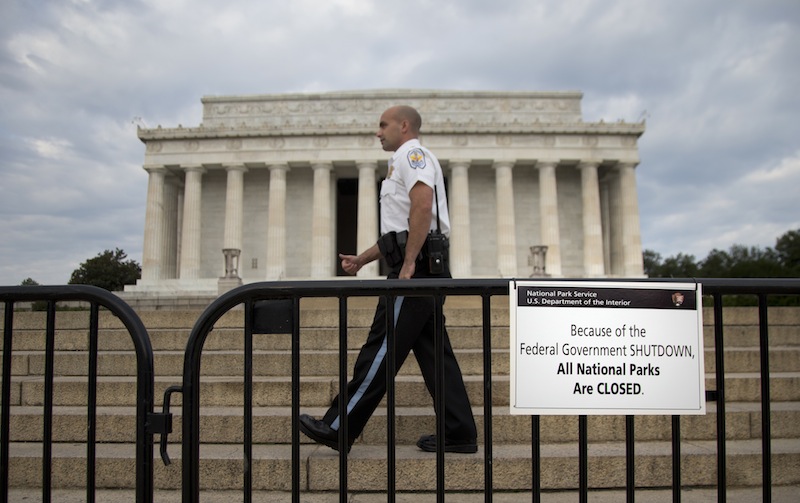American exceptionalism has been in full view of the world in the last few days, but not in the way that people usually mean. Since Monday night, the U.S. government has reminded the international community that it’s one of the few — maybe the only — that can actually shut down.
Foreign press correspondents, left trying to explain an inexplicable situation to their audiences back home, are dumbfounded. TPM talked with Washington reporters from around the world, everywhere from South Korea to Sweden to Turkey, to ask them what they thought about the first U.S. government shutdown in 17 years.
Some of their takes were quite frank.
Lee-Anne Goodman, Canadian Press
“This is a weird, messed-up feature of the American political system. I suppose the checks and balances obsession made sense 200 years ago. It makes no sense any longer.”
“For a country that fancies itself the greatest democracy on Earth, the fact that a small band of outliers in one party can essentially shut down the federal government over a petty political brawl seems woefully undemocratic.”
Joyce Karam, Al-Hayat (Arabic newspaper based in London)
“The whole concept is little surreal for our readers, trying to understand why the No. 1 country in the world cannot pass a budget. I come from Lebanon and our parliament is very ineffective, but ludicrous as it sounds, it is better than U.S. Congress when it comes to passing budgets.”
“Many wonder why the U.S. is doing this to its economy or why health care is not an option for everyone.”
Elliot Waldman, Tokyo Broadcasting Company
“Personally I think it’s an international embarrassment. It’s just another sign of the declining U.S. influence around the world and a sign of the very divisive extremist politics that have become prominent here. There’s no civilized discourse that I can see.”
Ilhan Tanir, Vatan (Turkish daily newspaper)
“It shows how independent the parts of the government are from each other. Sometimes you like it and sometimes you hate it. Sometimes you see features that appear genius to save the U.S. democratic system, sometimes you see other features that appear to be pushing the U.S. over the cliff. We are witnessing another cycle of this uniqueness.”
Sanna Toren Bjorling, Dagens Nyheter (Swedish daily newspaper)
“Not being able to fund a law or do such a fundamental thing as a budget is of course a problem and worrying for a nation, and somewhat crazy for a democracy like the U.S. The underlying political shifts and the polarization of Congress and the electorate has many interesting aspects and tells a much wider and complex story about the country. Some of the right wing movement I see as extreme.”
Nathan Guttman, Channel 1 (Israeli public television)
“It is a real challenge to explain the shutdown, mainly because there is no parallel in Israeli politics. Also, in a parliamentary system, the prime minister’s party has the majority in the parliament (or at least controls the coalition) so it is difficult to understand how Congress can force a shutdown.”
“The best I can do to explain this to viewers back home is to frame it in the context of a political battle between Republicans and Democrats. Political fighting is something Israelis understand well.”
Anders Tvegard, Norwegian Broadcasting Corporation
“It’s to us Norwegians hard to understand that it can be happening in one of the most influential countries in the world that you can have such a dysfunctional government. It is kind of joke or disbelief. We laugh about it. How is it possible at all? Why would they do that?”
“The political climate is so poisoned. It’s so different than what we’re used to. Our discussions are peanuts by comparison.”
Min Sun Shaim, Seoul Broadcasting System (South Korean television network)
“It’s pretty unique, compared to their government there. They don’t really know what exactly is a shutdown, so we have to explain what is. The U.S. economy is really important for the Korean economy as well, so we’ve been following this pretty closely. We want to inform our viewers what will impact on their lives.”
Lorenzo Mila, Television Espanola (Spanish public television)
“It’s a bit shocking, and I would say sometimes even embarrassing, coming from the best democracy. You’ve been so good when you were able to work together. If you ask my opinion, I think you fell asleep a little bit when the Soviet Union fell. Since that time you’ve been sleeping a little, now you’re having problems that you should not have.”
You have this beautiful system, so it is particularly hard to see that this system is not working. That Congress is blocking almost the whole agenda of the president, that’s really difficult to understand or explain.”
Lisa Millar, Australian Broadcasting Company
“After covering Washington for four years, the build-up to the shutdown felt almost predictable given the antagonism displayed from both sides. But I tipped it wrong. I was convinced someone would blink before midnight on Monday.”
“We’ve been showing vision of the shut down monuments, the words of animosity being exchanged between Democratic and Republican leadership and the question over future economic stability. When the U.S. sneezes, Australia catches cold.”






